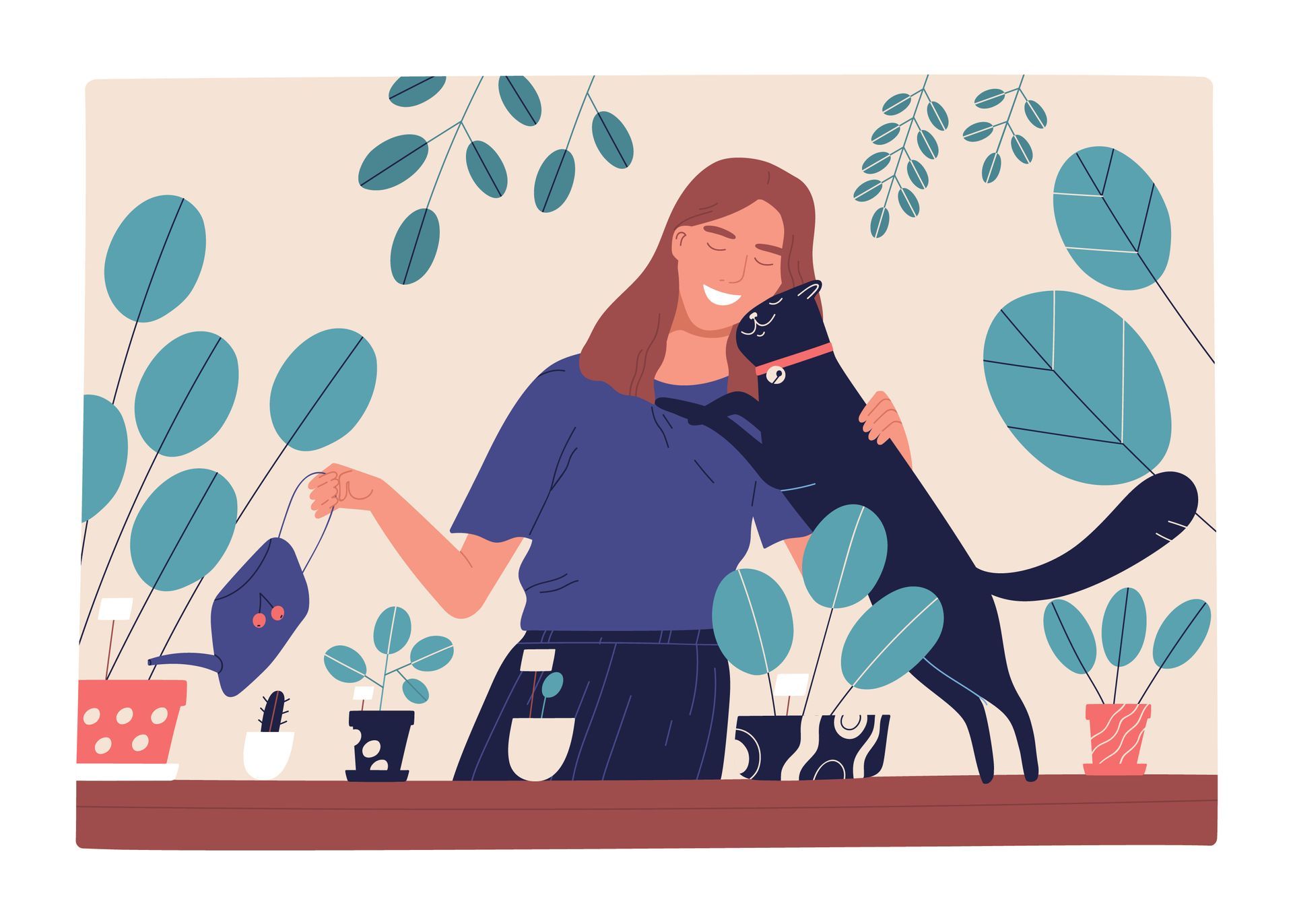How Caring for Pets and Plants Impacts Your Health and Happiness

From dogs and cats to window boxes of succulents and gardens full of green beans, caring for both pets and plants has the power to uplift your mental and emotional health. Below, we explore the ways caring for pets and plants can benefit your well-being.
ENVIRONMENT
Your environment affects your mood. By enhancing air quality and adding aesthetically pleasing elements to your environment, plants can make any space feel more welcoming and alive. Scientists continue to compile evidence that supports that exposure to nature can lower stress, increase focus, raise spirits, increase empathy, and even reduce the risk of psychiatric disorders. Whether you’re bringing the outdoors indoors or getting your hands into the earth in a backyard garden, you’re inviting nature to nurture you.
Additionally, having a friendly furball by your side or loving pet underfoot can welcome positive energy to your entire home.
COMFORT AND COMPANIONSHIP
“Pets and plants can elevate a person’s mood by decreasing cortisol levels, serving as a source of comfort, and increasing feelings of support,” said Thrive Reno’s Eating Disorder Program Clinical Lead and Therapist Mollie Pierce, MA, LCPC, NCC.
The love between pets, plants, and their caretakers is uncomplex and unconditional. This kind of companionship, most notably between pets and their owners, can help individuals cope with feelings of stress, anxiety , loneliness, and depression .
PURPOSE
Both pets and plants offer their caretakers a sense of purpose. Knowing your cat is waiting for you to pour kibble into its dish gives you a daily reason to rise and shine every morning. As for plants, watering them regularly and tending to their soil offers a similar sense of caregiving. Guarding your garden from critters and winterizing your roses can make you feel essential to their protection.
“By providing you with an added sense of meaning, pets and plants can keep you from feeling listless, increase your energy levels, and boost your overall productivity. Additionally, taking care of your pets and plants can be a reminder to care for yourself ,” Pierce explained.
MINDFULNESS
Practicing mindfulness can help reduce stress, improve focus, and regulate your emotions , among other benefits. Mindful moments spent with plants and pets encourage you to practice awareness and allow you to collect your thoughts. Breathing in the scent of lavender or eucalyptus, noticing the tilt of your elephant ear plant’s leaves, or taking your dog on a stroll around the park can allow you to arrive in and embrace the present moment.
SOCIAL
Upon becoming a plant or pet owner, you’ll be more likely to meet new people on dog walks and make new friends at plant exchanges. By connecting with other plant enthusiasts and pet lovers, you can foster a community that can broaden your sense of belonging, support, and purpose .
SYMBOLISM
Caring for your plants can inspire you to trim off elements of your life that aren’t serving you, like pulling the weeds of negative self-talk and planting seeds of positivity in their place. Gardening can also encourage you to pay attention to your own surroundings and adjust your environment as needed for continued growth. As for pets, afternoon cat naps can remind you that it’s okay to relax, playful pups can persuade you to indulge your inner-child, and all cuddly pets can encourage you to keep your heart open.
A PLACE TO GROW
At Thrive, we’re all for the flourishing nature of plants, growing where you’re planted, and thriving instead of settling for just surviving. We also love furry friends and the way their distinct personalities can give us joy. Healing and maintaining your mental and emotional health involves more than just caring for plants and pets, however.
If you’re seeking to cultivate a greater sense of happiness in your life, our therapists can help. We believe thriving means nurturing your mental, emotional, and physical well-being. Reach out to learn more about our therapeutic services .
The post How Caring for Pets and Plants Impacts Your Health and Happiness first appeared on Thrive Wellness.








